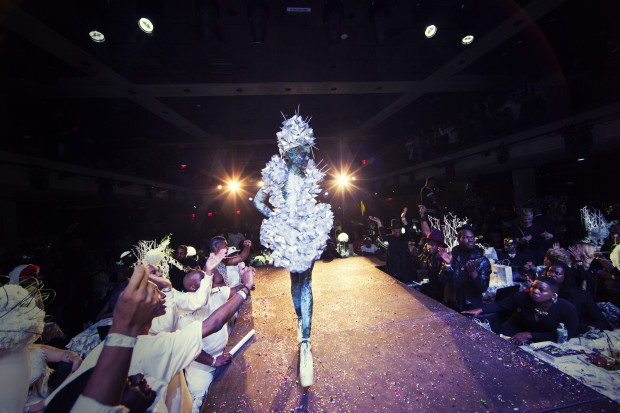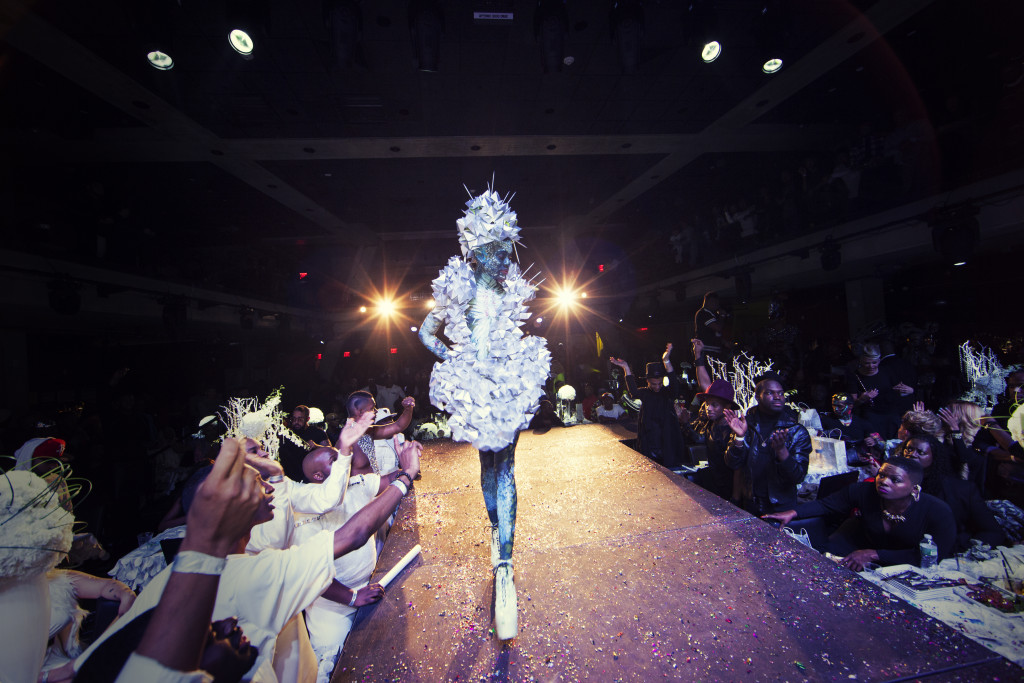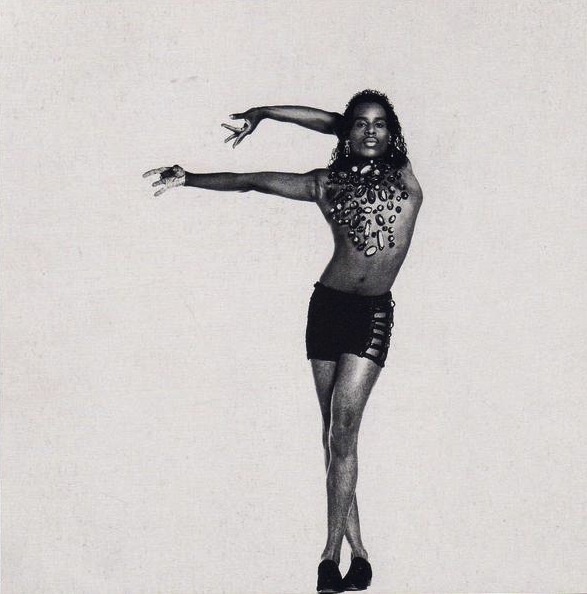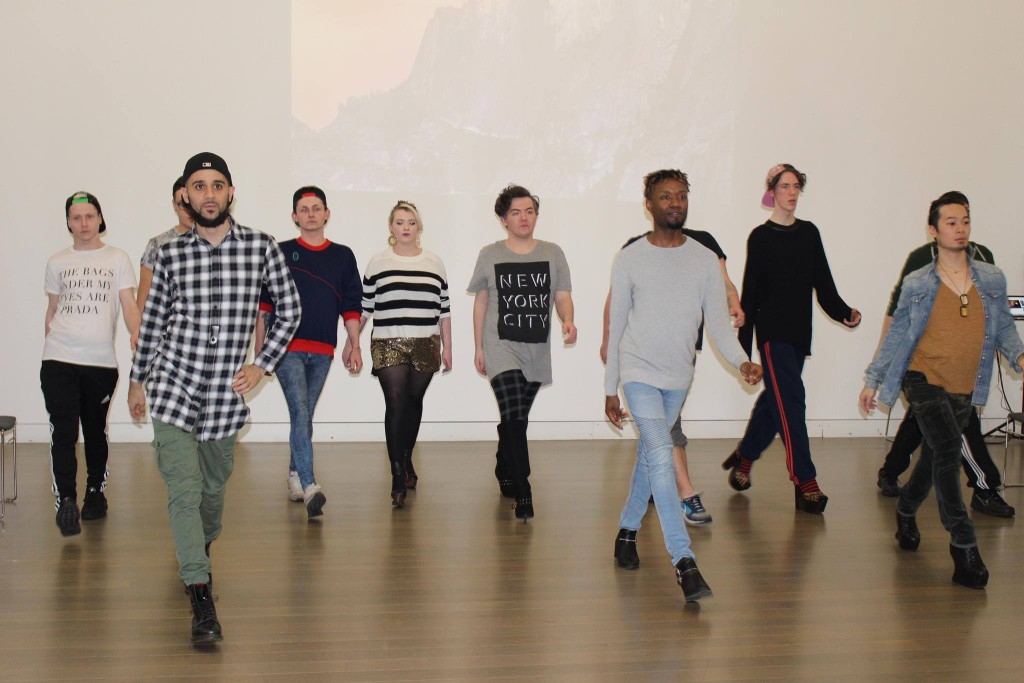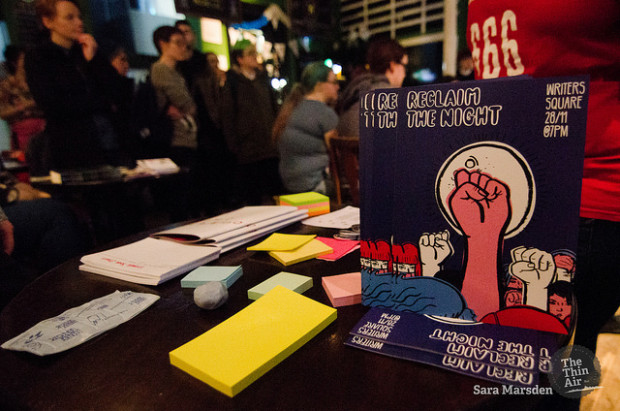Not only a stand-out event at this year’s Outburst Queer Arts Festival in Belfast, the premiere of HOUSE at The MAC on Thursday night is almost certainly set to be one of the most inspired happenings of the year. Having descended from the legendary Harlem Drag Scene, the New York House and Ballroom Community is one of the most exciting underground scenes in the world. HOUSE brings three of the city’s most innovative performance makers and cultural agitators together for an immersive performance and discussion that presents a very rare and intimate glimpse into the history of the House and Ballroom Scene. Brian Coney chats to organiser Claire Hall AKA DJ Venus Dupree.
Hi Claire. Before we touch on the event itself, how were you introduced to the world of House and Ballroom personally?
“The event is going to explain the history of Ballroom but in terms of where I come into it, I went to New York properly in 2010. I had been there before but I was only 20 and didn’t really know why I was there. But more recently, I returned and walked around New York and really immersed myself in it. When I came back I just watching loads of documentaries on the city and that’s how I properly discovered Disco and the Disco scene. There was one BBC documentary and the first track was ‘Spank’ Jimmy Bo Horne. I instantly thought, “That sounds so good.” It just started talking about David Mancuso, so I was really interested in that so I bought a book called Love Saves the Day by Tim Lawrence. It’s a really comprehensive document of the New York Disco and Dance scene from 1969 right up. It’s a really great reference point, from Mancuso, who started all the notorious parties in the Loft to Studio 54, the underground influence, the mainstream and beyond.”
“Within that, then, I found out about Paris DuPree who started the ballroom scene, so that’s where it begins. There’s a really good documentary called Paris Is Burning. Essentially, that’s where I came to it via Disco. It was made in the 80s and it came out in the 90s, when a lot of people were looking at the the Ballroom scene and the artform of vogue. Madonna and Malcolm McLaren all jumped on that. Madonna took two members of the legendary House of Xtravaganza on her Blonde Ambition tour and the documentary In Bed With Madonna. It all kind of blew up from there.”
Looking a little further back, where and how were the very early seeds of the scene sown?
“The scene began essentially because there was still a lot of racism. That’s the whole thing with Disco, all these factions getting together in the underground – mainly gay, black and Latino. They formed these incredible alliances that really influenced mainstream House, dance, whatever. Infamously, Crystal Labeija and Paris DuPree were big in their scene and sick of not winning because they were black, so they went back up to Harlem and started their own balls and decided that they were going to make their own scene where they became the “Mothers” of the House of Labeija and DuPree. So, this is how it began. The idea was they’d go to their balls and they’d have these kind of protégés of children who’d help them get ready for the balls. The house system grew quite quickly from that. It started metaphorically but in some and most cases it became a physical house because a lot of the kids, some as young as 13 who were kicked out of their home because they were gay or identified as trans, sought them out as places to go. In this very beautiful, profound way the house scene became your “mother”, your alternative family.
So people started forming houses, some of which were named after fashion like St Laurent, Willi Ninja (below). These grew and grew; this clandestine world where balls would start at 2am in the morning. A lot of the homeless kids would steal from the shops to make sure there outfits were ready for the ball. Initially it was more of a drag pageant but it became more and more complex as every scene does, with structures. Then there became categories in the balls, like Realness – which is one of the most popular, and still is. The idea of particularly 80s and 90s NY, you would win the realness category if you could pass on the street as a women. And there’s the likes of Butch Queen and Executive Realness, where you look like a wall street executive. And that’s only touching the surface.”
“Of course, I’m kind of “speaking” for them and this is often a problem, for example with the likes of Paris is Burning – a film that really helps set the context for what you’re going to see live on stage on Thursday – which I’m not going to publicise too much. People have stopped asking the filmmaker if they can use it and buy the rights for it. The film is incredible, as is the soundtrack but Jennie Livingstone is criticised because, essentially, she was a white, privileged filmmaker. She never got anyone to sign any forms which might just be naïveté on her part, but it went on win the Grand Jury prize at Cannes and the like yet a lot of the subjects who were essentially queer, black people of colour didn’t really benefit and it seemed like almost a fetishization. It was kind of a case of “As usual, white people benefit from this incredible thing”. The community don’t feel it was necessarily fully representative because it wasn’t made by one of them. When I first watched Paris is Burning, I thought, “Woah it’s really interesting…” but there’s always a much bigger picture.”
On which note, let’s talk about HOUSE itself. What’s happened and how did you go about organising the evening?
“When they brought me in we discussed how we were going to approach this it was like, “Let’s tell our story”. Twiggy Pucci Garçon (pictured top), Chichi Mizrahi and Kimora Miyake-Mugler are all in different houses and very active members in the House Ballroom Community. They’re also really good friends. The first half of HOUSE is going to be a performance with visuals and they’re going to take us through the history – from the beginning to where we’re at now. Then there’s a whole other side of if that ties in. Paris is Burning almost makes it look you could “only” exist in the Ballroom. And maybe, at the time of its filming, there wasn’t but the youth-led scene which is the Chichi scene is a smaller subsidiary of that is all about activism and all of these people work as community health specialists for AIDS/HIV awareness and support organisations and Twiggy works for True Colours, set up by Cyndi Lauper for LGBT youth. They’re what they call Gatekeepers, the Mothers of the family structure that helps out the youth, to find a way through expressing yourself through ballroom and the community that comes with it. So there’ll be a performance of the history of Ballroom – a really beautiful interactive pageant and the second half is more of a performative discussion which I’m going to join in on. That’s equally as exciting as it’s people telling their stories. Then we’re going to take a tiny break and drag everyone over to Boombox to hear MikeQ DJ. The Ballroom scene is just growing and growing and growing, so it’s all symbiotic with the movement of voguing. It’s going to be very fun.”
Of course, there’s a lot more to vogue and voguing than Madonna. Can you offer up a bit of insight?
So, Chichi’s coming and he’s a voguer and one of the categories is vogue. Vogue initially was very simply “strike a pose” from Vogue magazine. “You look beautiful and you’re going to battle me”, so it’s called throwing shade. It’s like saying “your momma’s so fat” via movement and beauty. I will strike a pose and you’ll try to emulate it and then I’ll try another. But it’s morphed into this movement of quick succession poses. That’s old wave voguing but there’s also new wave voguing, which Chichi does. It’s all about looking as feminine as you can, really. Within that, the specific parameters of what makes good vogue and everyone incorporates their own signature moves and it’s really incredible. The ballroom scene really started in late 60s and early 70s, with Paris and Crystal, which you’ll learn at the event. Voguing started in the 90s. What was interesting was vogue seemed quick and fleeting because Madonna did and it appeared to never exist again. But the reality is she came and went and the scene continued. The beauty and pageant still exists as it’s about community and it still continues. In fact, it’s much stronger than ever before. With that in mind, when I was selling the idea of HOUSE first I didn’t know what it was going to be until I started working at it properly but it’s all come together as intended. It’s set to be a really special night. People need to come out and party!”
Go here to buy tickets to HOUSE at the MAC on Thursday, November 19.
Stream Venus Dupree’s Paris is Burning-inspired mix below.

